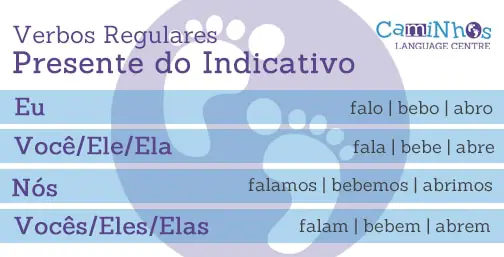Blog
Present tense of regular verbs in Portuguese – Presente do Indicativo | Lesson 12
- Wednesday July 3rd, 2019
- Posted by: Guest
- Category: Learn the Portuguese Language and Portuguese Grammar

Learn about the present tense of regular verbs in Portuguese with this online lesson from Caminhos. Study Brazilian Portuguese with us.
The use of Present Tense in Portuguese (Presente do Indicativo)
- We use the present tense to talk about current events, habits, routine or something you consider permanent.
- We can also use the present tense to indicate an action in the future. But, in that case, we need to use words that ‘define’ the future. Example: Ele viaja amanhã. (He travels tomorrow.)
Conjugation of Present Tense in Portuguese (Presente do Indicativo)
Are you ready to learn about the conjugation of the verbs?
Let’s go!
Verbs ending in -ar
Falar (To speak)
Eu falo (I speak)
Você/Ele/Ela fala (You/He/She speaks)
Nós falamos (We speak)
Vocês/Eles/Elas falam (They speak)
Verbs ending in -er
Beber (To drink)
Eu bebo (I drink)
Você/Ele/Ela bebe (You/He/She speaks)
Nós bebemos (We speak)
Vocês/Eles/Elas bebem (They speak)
Verbs ending in -ir
Abrir (To open)
Eu abro (I open)
Você/Ele/Ela abre (You/He/She opens)
Nós abrimos (We open)
Vocês/Eles/Elas abrem (They open)
“A gente” instead of “Nós”
Ps: When using “a gente” instead of “nós”, we use the verb in the singular form. A gente fala / A gente bebe / A gente abre.
 A gente fala português! (We speak Portuguese!)
A gente fala português! (We speak Portuguese!)
 Davi bebe café todos os dias. (Davi drinks coffee everyday.)
Davi bebe café todos os dias. (Davi drinks coffee everyday.)
 Breno abre a porta. (Breno opens the door.)
Breno abre a porta. (Breno opens the door.)
Other regular verbs
-ar: Dançar, pagar estudar, trabalhar, cantar, comprar, pegar, tomar, jantar, almoçar, alugar, acordar, etc.
-er: Comer, escrever, vender, oferecer, descer, entender, correr, esquecer, prometer, etc.
-ir: Partir, assistir, insistir, dividir, discutir, permitir, desistir, proibir, etc.
Homework
Now it’s your turn.
Complete the sentences:
- Bel _____ (tomar) café da manhã todos os dias. [Bel _____ (to have) breakfast every day.]
- Marcela e Fernando _____ (dançar) funk aos sábados. [Marcela and Fernando _____ (to dance) funk on Saturdays.]
- Eu _____ (falar) português, inglês e espanhol. [I _____ (to speak) Portuguese, English and Spanish.]
- Nós não _____ (comprar) pão durante a semana. [We don’t _____ (to buy) bread during weekdays.]
- Damião _____ (entender) tudo. [Damião _____ (to understand) it all.]
- Amanda e Maria _____ (correr) na praia de manhã. [Amanda and Maria _____ (to run) at the beach in the mornings.]
- Lennon não _____ (esquecer) o nome das pessoas facilmente. [Lennon doesn’t _____ (to forget) people’s name easily.]
- A gente nunca _____ (comer) massa de noite. [We never _____ (to eat) pasta at night.]
- Deise _____ (assistir) ao futebol feminino. [Deise _____ (to watch) the women’s football game.]
- O avião _____ (partir) às 21h. [The plane _____ (to leave) at 9pm.]
- A professora não _____ (permitir) comer na sala de aula. [The teacher doesn’t _____ (to allow) people to eat inside the classroom.]
- Eu _____ (insistir) em falar com você. [I _____ (to insist) on talking to you.]
Answers
- toma
- dançam
- falo
- compramos
- entende
- correm
- esquece
- come
- assiste
- parte
- permite
- insisto
Check other Portuguese lessons online at Caminhos Blog clicking here.
If you’re interested in coming to Rio de Janeiro, Brazil, and learn more about the culture and the Portuguese language, sign up for classes at Caminhos Language Centre and have the full Carioca experience. We offer Portuguese classes for foreigners, free activities in Rio and volunteer opportunities in Brazil on our own NGO.


 Deutsch
Deutsch Français
Français Português
Português Español
Español




